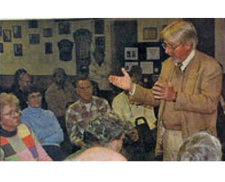Greevy discusses gas leases
From the March 24, 2006 Williamsport Sun-Gazette. LLA member Bud Greevy discusses gas leases at a workshop:
Legal details of gas leases explained
By DAVID THOMPSON
JERSEY SHORE — The Penn State Cooperative Extension of Lycoming County on Thursday held the second of a series of workshops addressing the issue of gas exploration leases.
Thursday’s workshop, held at the Independent Hose Co. fire hall, focused on legal issues landowners should consider before leasing their properties for gas exploration.
Featured speaker at Thursday’s work shop was attorney Lester “Bud” Greevy who observed that since 1968 he’s seen four different generations of gas leases move through the area.
Because companies never actually drilled for gas back then, landowners could take the money offered them without having to worry about the terms of the lease, Greevy said.
“It was free money,” he said.
But times have changed. Energy prices are up and new technology allows companies to drill much farther into the earth.
Because of that, several energy companies have shown significant interest in this region.
“This time it might be different. They’re offering serious money for these leases,” Greevy said.
Because there is a greater potential for drilling to occur, landowners should be educated about gas agreements before they lease their properties for exploration, he said.
They have the right to insist on any of a number of changes and stipulations to a standard gas lease.
Agreements should include language that describes the length of the lease and terms and methods of payment, including bonuses, per acre rental and, should gas be found, royalties.
In addition, a fee should be included in the lease that sets a rental fee, should the gas company cap the well without removing gas, Greevy said.
Lease agreements also should include, among other things, specifications for access roads and pipelines, provisions and charges for land restoration and reforestation, and restrictions regarding how close drilling can be done to buildings, streams and ponds.
“Put it into that lease so they know they’re not putting that well in your front yard,” Greevy advised.
Landowners also should consider payment for damaged timber or farm land and use of water for the drilling operation.
Greevy recommended having a water test performed prior to any drilling or seismic testing so that if water quality is affected by those activities, there will be evidence.
Landowners can restrict the number of wells drilled on their properties or stipulate that they must be notified well in advance before any drilling is performed.
Landowners also have the right to review company records and designate an individual to audit those files. They can also place stipulations in the lease concerning time limits for removal of equipment.
A method of resolving disputes, such as an arbitrator, should also be included in the lease, Greevy said.
“You want to have an alternative dispute resolution that is quick and inexpensive,” he said. “You don’t want to be in court forever.”
Although the number of stipulations could affect the value of the lease, “most of the things we’re talking about here are not deal killers,” Greevy said.
Tom Murphy, education specialist for the county Cooperative Extension Office, said landowners shouldn’t be timid when it comes to negotiating the terms of their lease.
If there is a question about an issue, it should be addressed before the lease is signed, he said.
Murphy said standard leases should be viewed as a starting point from which to negotiate the terms that best suit both parties involved in the transaction.
Jim Borbeau of the Texas-based Borbeau Land Service said he has been in the gas exploration business for 28 years. Borbeau said landowners should beware of hidden clauses in leases that allow gas companies the option of automatically extending the lease.
Greevy agreed.
Because the amount of money being offered for gas leases is increasing, an automatic extension clause is not necessarily good because it could lock the landowner into a lower rate, he said.
“Prices are going up. You don’t want that,” Greevy said. “That’s like buying a 2006 car at 1996 prices.”
Murphy said another workshop will be held in mid-April.

